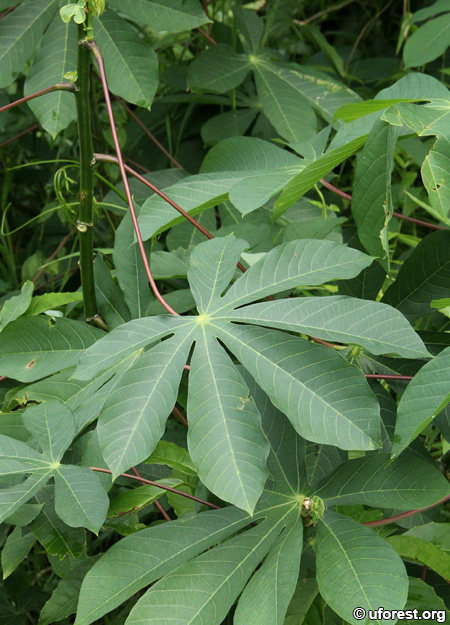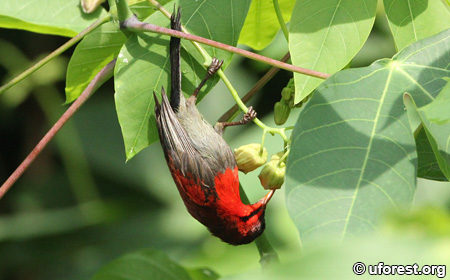Manihot carthagenensis glaziovii (Müll.Arg.) Allem
| Etymology | Genus | From Manioc, the Brazilian name for the plant |
|---|---|---|
| Species | From from Cartagena (Columbia); After Auguste François Marie Glaziou, 20th century French plant collector in Brazil | |
| Family | Euphorbiaceae | |
| Synonyms | - | |
| Common Names | Ceara Rubbertree | |
| Status | Exotic: Naturalised | |
| Form | Shrub | |
| Native Distribution | Brazil | |
Diagnostics:
Manihot carthagenesis subspecies glaziovii is a common shrub that is usually found at forest edges under bright sun. The leaves are palmately lobed that are broader that the tip, and usually comes with red petioles.
It closely resembles a relative, the Tapioca (Manihot esculenta) but the latter have smaller leaves as well as narrow and more linear leaf lobes. The colour of the petiole is usually green too.
Interesting Facts:
The Ceara Rubbertree, as its name suggests, used to be cultivated widely as a source of rubber. However, interest in it waned with the popularity of Pará Rubber Tree.
While currently classified as a subspecies under Manihot carthagenesis, da Silveira et al. (2019) suggested that, based on morphological and ecological traits, phylogenetic evidence, and haplotype network analysis, this should be placed as a unique separate species as Manihot glaziovii.

A hedge of Ceara Rubbertree at Upper Seletar.

Leaf with red petiole.

Bell-like flowers.

Male flower.

Crimson Sunbird obtaining nectar.
References
da Silveira TC, Martins ALL, Rody HVS, de Oliveira LO. (2019) Evolutionary history of Manihot carthagenensis (Euphorbiaceae) and allied species in eastern South America. Molecular Phylogenetics and Evolution, 132: 207-218.
Author: Siyang
Posted: 2018-12-29 / Modified: 2025-08-27